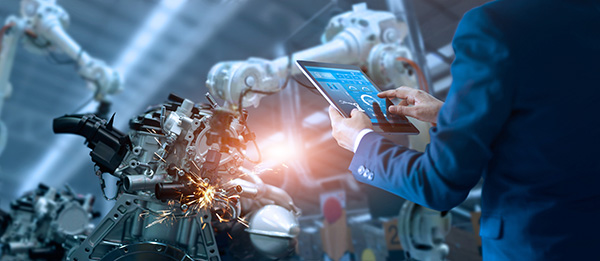Manufacturers can use AI to improve interoperability, overcome labor shortages, and revolutionize core manufacturing functions.
By Grace Nam, Strategic Solutions Manager, Laserfiche
A recent survey of 300 manufacturing professionals has revealed a pervasive issue: frequent delays in operational processes. Nearly one-third of the participants reported experiencing these delays multiple times a week. These interruptions not only consume valuable time but also hinder productivity and profitability, emphasizing the urgent need for effective solutions to these operational challenges.
Currently, a significant amount of time in manufacturing is spent on document management and routine tasks, such as tracking paperwork, ensuring document accuracy, organizing files, and data correction. Integrating AI into manufacturing yields concrete advantages, including lower operational expenses, heightened productivity, and superior data management. AI can reduce labor costs and diminish human error by automating repetitive tasks. It also removes bottlenecks and delays, promoting a more efficient workforce by handling both routine and complex decision-driven tasks. Real-time data collection and analysis offer critical insights, enhancing decision-making and strategic planning.

Here are five critical ways manufacturers can use AI to be equipped to make more informed decisions, rapidly adapt to market shifts, and gain a competitive edge in an increasingly dynamic industry.
The manufacturing sector faces dual challenges: a scarcity of STEM professionals and the absence of standardized processes. AI technology presents a transformative solution by automating intricate tasks traditionally requiring specialized expertise, such as engineering, programming, and data analysis, alongside a deep understanding of manufacturing processes, quality norms, and regulatory requirements. This automation streamlines rule-based workflows, liberating experts and employees from mundane administrative duties and empowering them to concentrate on strategic and value-driven endeavors. By harnessing AI for task automation, manufacturers not only mitigate the shortage of skilled professionals but also elevate the competencies of their workforce.
Despite concerns about AI displacing jobs, its integration can actually enrich the human workforce. By automating conventional manufacturing processes, AI liberates personnel to engage in higher-level activities that demand creativity, problem-solving, and human ingenuity. This shift enhances job satisfaction and catalyzes innovation within organizations. As AI becomes ingrained in manufacturing, there will be a heightened demand for individuals proficient in AI deployment and adept at collaborating with intelligent systems. This trend necessitates robust upskilling and reskilling initiatives, cultivating a workforce adept at navigating the evolving landscape of human-machine interaction.
One of the foremost challenges in manufacturing lies in the seamless integration of diverse software systems. This issue impedes efficient data flow and hampers collaboration across departments. AI emerges as a transformative solution, leveraging sophisticated machine learning algorithms to harmonize data exchange between disparate platforms. By establishing this interconnected ecosystem, AI enhances operational cohesion while empowering real-time decision-making and streamlined process management. This capability enables manufacturers to swiftly adapt to market fluctuations and operational demands, ensuring agility and responsiveness in an increasingly competitive landscape.
AI’s role extends beyond mere connectivity; it fundamentally reshapes how manufacturers can harness data. By automating data interpretation and analysis across integrated systems, AI not only optimizes resource allocation but also uncovers hidden efficiencies within complex operational workflows. AI’s ability to continuously learn from data patterns enhances predictive capabilities, enabling proactive decision-making that preemptively addresses challenges before they escalate. As manufacturing increasingly relies on interconnected technologies, AI-driven interoperability becomes not just a solution but a strategic advantage for driving sustainable growth and innovation.
AI stands poised to transform fundamental manufacturing operations, spanning from sales and supply chain management to quality control and inventory oversight. Through AI integration, manufacturers gain the ability to preemptively identify potential disruptions, optimize resource distribution, and guarantee punctual deliveries. For instance, AI algorithms harness historical and real-time data to forecast demand accurately, thereby aligning inventory levels with market dynamics and mitigating the risks associated with under or overproduction.
This transformative capability marks a pivotal shift in manufacturing, facilitating decisions based on up-to-the-minute data insights rather than outdated information. Beyond operational enhancements, AI offers unparalleled scalability, empowering manufacturers to expand their enterprises without proportional increases in complexity. By revolutionizing records management, data governance, and process automation across various enterprise applications, AI ensures that organizational integrity and efficiency are upheld even amidst scaling operations. This adaptive scalability positions manufacturers to meet current demands and proactively navigate future challenges with agility and precision.
AI-powered data capture tools are revolutionizing how manufacturers manage and utilize their data. These advanced tools streamline vast volumes of content, extracting pertinent information and automatically organizing it with precision. This capability proves especially invaluable in handling compliance documentation, traditionally cumbersome and intricate. By automating the capture and classification of data, AI ensures documents are effortlessly searchable and readily retrievable, effectively slashing administrative overhead.
Manual data entry is notorious for introducing errors that can trigger costly delays across an organization. Leveraging sophisticated recognition capabilities, AI excels at extracting data accurately from documents, vastly improving data integrity and bolstering the reliability of information crucial for decision-making processes. Furthermore, AI adeptly categorizes metadata, simplifying document management and retrieval processes, thereby optimizing overall records management efficiency.
Ensuring compliance with industry regulations remains a critical priority for manufacturers. AI revolutionizes compliance management by automating the capture and management of data and documents. AI-powered systems for document management streamline the organization, retrieval, and updating of compliance-related documents, significantly reducing errors, and expediting audit processes. By alleviating the complexities associated with compliance requirements, AI enables manufacturers to concentrate more effectively on core operational activities and strategic initiatives.
The integration of AI into manufacturing goes beyond being merely a technological upgrade but rather is a transformative shift poised to resolve long-standing operational inefficiencies and propel the industry into a new era of productivity and innovation. By addressing workforce challenges, enhancing interoperability, revolutionizing core functions, transforming data handling, and simplifying compliance management, AI equips manufacturers with the tools necessary to thrive in a competitive and dynamic market. As AI continues to evolve, its role in manufacturing will expand, necessitating ongoing adaptation and upskilling of the workforce. Embracing AI is not just about staying ahead; it’s about building a resilient, efficient, and forward-thinking manufacturing environment capable of meeting the demands of the future.

Grace Nam is the Strategic Solutions Manager at Laserfiche, where she specializes in solving the toughest industry challenges with innovative solutions. She performs market research to revamp processes in the most highly regulated industries — healthcare and manufacturing. Nam empowers industry leaders with her insights, helping organizations implement strategies and strengthen organizational resilience, based on the latest technologies and industry trends. Over the course of her career, Nam experienced firsthand the challenges in adopting new technologies that the healthcare and manufacturing industries face, and how this impacts employee productivity and satisfaction, as well as organization efficiency in the face of shifting customer demand or unexpected disruptions. Prior to her role at Laserfiche, Nam drove strategy as part of the marketing teams at Legrande Health and Crane ChemParma & Energy, among other organizations. She lives in Irvine, California.
Scott Ellyson, CEO of East West Manufacturing, brings decades of global manufacturing and supply chain leadership to the conversation. In this episode, he shares practical insights on scaling operations, navigating complexity, and building resilient manufacturing networks in an increasingly connected world.